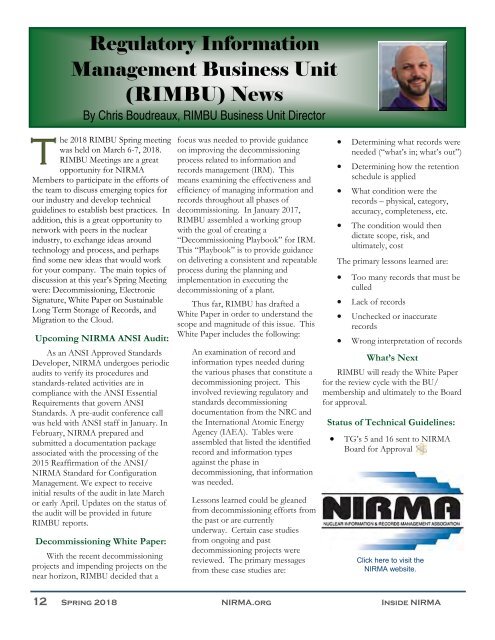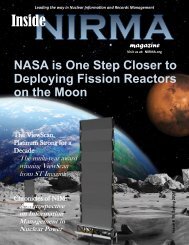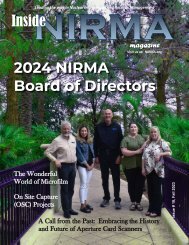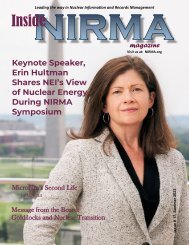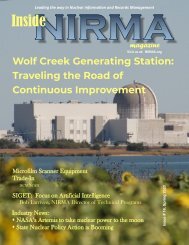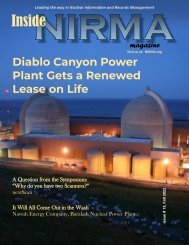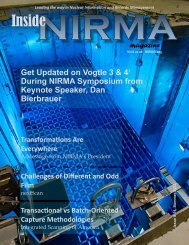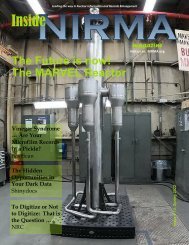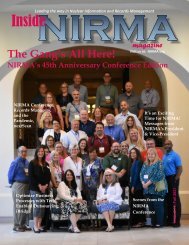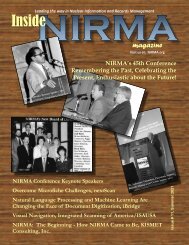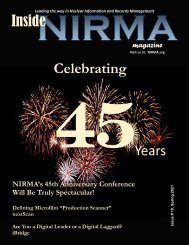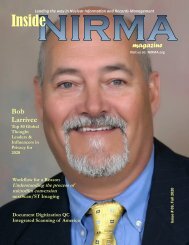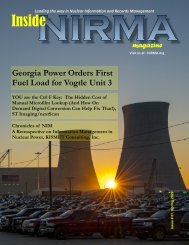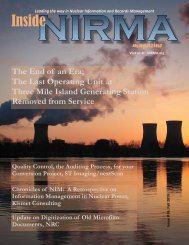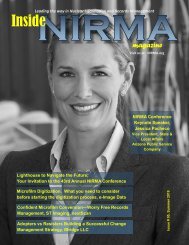Inside NIRMA - Spring March 2018 Issue
Create successful ePaper yourself
Turn your PDF publications into a flip-book with our unique Google optimized e-Paper software.
Regulatory Information<br />
Management Business Unit<br />
(RIMBU) News<br />
By Chris Boudreaux, RIMBU Business Unit Director<br />
he <strong>2018</strong> RIMBU <strong>Spring</strong> meeting<br />
was held on <strong>March</strong> 6-7, <strong>2018</strong>.<br />
RIMBU Meetings are a great<br />
opportunity for <strong>NIRMA</strong><br />
Members to participate in the efforts of<br />
the team to discuss emerging topics for<br />
our industry and develop technical<br />
guidelines to establish best practices. In<br />
addition, this is a great opportunity to<br />
network with peers in the nuclear<br />
industry, to exchange ideas around<br />
technology and process, and perhaps<br />
find some new ideas that would work<br />
for your company. The main topics of<br />
discussion at this year’s <strong>Spring</strong> Meeting<br />
were: Decommissioning, Electronic<br />
Signature, White Paper on Sustainable<br />
Long Term Storage of Records, and<br />
Migration to the Cloud.<br />
Upcoming <strong>NIRMA</strong> ANSI Audit:<br />
As an ANSI Approved Standards<br />
Developer, <strong>NIRMA</strong> undergoes periodic<br />
audits to verify its procedures and<br />
standards-related activities are in<br />
compliance with the ANSI Essential<br />
Requirements that govern ANSI<br />
Standards. A pre-audit conference call<br />
was held with ANSI staff in January. In<br />
February, <strong>NIRMA</strong> prepared and<br />
submitted a documentation package<br />
associated with the processing of the<br />
2015 Reaffirmation of the ANSI/<br />
<strong>NIRMA</strong> Standard for Configuration<br />
Management. We expect to receive<br />
initial results of the audit in late <strong>March</strong><br />
or early April. Updates on the status of<br />
the audit will be provided in future<br />
RIMBU reports.<br />
Decommissioning White Paper:<br />
With the recent decommissioning<br />
projects and impending projects on the<br />
near horizon, RIMBU decided that a<br />
focus was needed to provide guidance<br />
on improving the decommissioning<br />
process related to information and<br />
records management (IRM). This<br />
means examining the effectiveness and<br />
efficiency of managing information and<br />
records throughout all phases of<br />
decommissioning. In January 2017,<br />
RIMBU assembled a working group<br />
with the goal of creating a<br />
“Decommissioning Playbook” for IRM.<br />
This “Playbook” is to provide guidance<br />
on delivering a consistent and repeatable<br />
process during the planning and<br />
implementation in executing the<br />
decommissioning of a plant.<br />
Thus far, RIMBU has drafted a<br />
White Paper in order to understand the<br />
scope and magnitude of this issue. This<br />
White Paper includes the following:<br />
An examination of record and<br />
information types needed during<br />
the various phases that constitute a<br />
decommissioning project. This<br />
involved reviewing regulatory and<br />
standards decommissioning<br />
documentation from the NRC and<br />
the International Atomic Energy<br />
Agency (IAEA). Tables were<br />
assembled that listed the identified<br />
record and information types<br />
against the phase in<br />
decommissioning, that information<br />
was needed.<br />
Lessons learned could be gleaned<br />
from decommissioning efforts from<br />
the past or are currently<br />
underway. Certain case studies<br />
from ongoing and past<br />
decommissioning projects were<br />
reviewed. The primary messages<br />
from these case studies are:<br />
• Determining what records were<br />
needed (“what’s in; what’s out”)<br />
• Determining how the retention<br />
schedule is applied<br />
• What condition were the<br />
records – physical, category,<br />
accuracy, completeness, etc.<br />
• The condition would then<br />
dictate scope, risk, and<br />
ultimately, cost<br />
The primary lessons learned are:<br />
• Too many records that must be<br />
culled<br />
• Lack of records<br />
• Unchecked or inaccurate<br />
records<br />
• Wrong interpretation of records<br />
What’s Next<br />
RIMBU will ready the White Paper<br />
for the review cycle with the BU/<br />
membership and ultimately to the Board<br />
for approval.<br />
Status of Technical Guidelines:<br />
• TG’s 5 and 16 sent to <strong>NIRMA</strong><br />
Board for Approval<br />
Click here to visit the<br />
<strong>NIRMA</strong> website.<br />
12 <strong>Spring</strong> <strong>2018</strong> <strong>NIRMA</strong>.org <strong>Inside</strong> <strong>NIRMA</strong>


